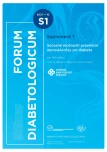-
Medical journals
- Career
Antidiabetic treatment in prevention of atherosclerosis: first half-century
Authors: Ivan Tkáč
Authors‘ workplace: Excelentný tím pre výskum aterosklerózy (EXTASY), IV. interná klinika UPJŠ LF a UN LP Košice
Published in: Forum Diab 2021; 10(Supplementum 1): 9-15
Category:
Overview
The studies looking at the effect of antidiabetic drugs on cardiovascular disease in type 2 diabetes (T2D) in 1960–2010 have provided some valuable insights. The UGDP study indicated a possible risk of treatment by the sulphonylurea derivative tolbutamide and by a biguanide phenformin. In the UKPDS study, metformin was the only antidiabetic agent to have prevented cardiovascular morbidity and mortality in patients with T2D. However, neither the risk, nor the benefit of newer sulphonylureas or insulin has been demonstrated in the UPKDS study. Among PPAR-γ agonists, pioglitazone had a neutral effect on cardiovascular morbidity and mortality in the PROactive study. A meta-analysis pointed to a possible increased cardiovascular risk associated with rosiglitazone use, but it was not confirmed in the RECORD study. However, glitazones significantly increased the risk of hospitalizations for heart failure. Long-term achievement of HbA1c < 7 % with intensive T2D therapy tested in the ACCORD, ADVANCE and VADT studies has also not been shown to be beneficial, mainly due to an increased risk of hypoglycaemia in patients with pre-existing cardiovascular disease.
Keywords:
antidiabetic treatment – insulins – oral antidiabetic drugs – prevention of cardiovascular endpoints
Sources
- Ferrannini E, Rosenstock J. Clinical translation of cardiovascular outcome trials in type 2 diabetes: Is there more or is there less than meets the eye? Diabetes Care 2021; 44(3): 641–646. Dostupné z DOI: <http://dx.doi.org/10.2337/dc20–0913>.
- Blackburn H, Jacobs DR jr. The University Group Diabetes Program 1961–1978: pioneering randomized controlled trial. Int J Epidemiol 2017; 46(5): 1354–1364. Dostupné z DOI: <http://dx.doi.org/10.1093/ije/dyw168>.
- Meinert CL, Knatterud GL, Prout TE et al. [University Group Diabetes Program]. A study of the effects of hypoglycemic agents on vascular complications in patients with adult-onset diabetes: II. Mortality results. Diabetes 1970; 19(Suppl): 789–830.
- Knatterud GL, Meinert CL, Klimt CR et al. [University Group Diabetes Program Research Group]. Effects of hypoglycemic agents on vascular complications in patients with adult-onset diabetes. IV. A preliminary report on Phenformin results. JAMA 1971; 217(6): 777–784.
- [University Group Diabetes Program Research Group]. Effects of hypoglycemic agents on vascular complications in patients with adult-onset diabetes. VII. Mortality and selected non-fatal events with insulin treatment. JAMA 1979; 240(1): 37–42.
- [UK Prospective Diabetes Study (UKPDS) Group]. Intensive blood glucose control with sulphonylureas or insulin compared with conventional treatment and risk of complications in patients with type 2 diabetes (UKPDS 33). Lancet 1998; 352(9131): 837–853. Dostupné z DOI: <https://doi.org/10.1016/S0140–6736(98)07019–6>.
- [UK Prospective Diabetes Study (UKPDS) Group]. Effect of intensive blood-glucose control with metformin on complications in overweight patients with type 2 diabetes (UKPDS 34). Lancet 1998; 352(9131): 854–865. Dostupné z DOI: <https://doi.org/10.1016/S0140–6736(98)07037–8>.
- Kooy A, de Jager J, Lehert P et al. Long-term effects of metformin on metabolism and microvascular and macrovascular disease in patients with type 2 diabetes mellitus. Arch Intern Med 2009; 169(6): 616–625. Dostupné z DOI: <http://dx.doi.org/10.1001/archinternmed.2009.20>.
- Han Y, Xie H, Liu Y et al. Effect of metformin on all-cause and cardiovascular mortality in patients with coronary artery diseases: a systematic review and an updated meta-analysis. Cardiovasc Diabetol 2019; 18(1): 96. Dostupné z DOI: <http://dx.doi.org/10.1186/s12933–019–0900–7>.
- Giaccari A, Solini A, Frontoni S et al. Metformin benefits: Another example for alternative energy substrate mechanism? Diabetes Care 2021; 44(3): 647–654. <http://dx.doi.org/10.2337/dc20–1964>.
- Dormandy JA, Charbonnel B, Eckland DJ et al. Secondary prevention of macrovascular events in patients with type 2 diabetes in the PROactive Study (PROspective pioglitAzone Clinical Trial In macroVascular Events): a randomised controlled trial. Lancet 2005; 366(9493): 1279–1289. Dostupné z DOI: <http://dx.doi.org/10.1016/S0140–6736(05)67528–9>.
- Nissen SE, Wolski K. Effect of rosiglitazone on the risk of myocardial infarction and death from cardiovascular causes. N Engl J Med 2007; 356(24): 2457–2471. Dostupné z DOI: <http://dx.doi.org/10.1056/NEJMoa072761>.
- Home PD, Pocock SJ, Beck-Nielsen H et al. Rosiglitazone evaluated for cardiovascular outcomes in oral agent combination therapy for type 2 diabetes (RECORD): a multicentre, randomised, open-label trial. Lancet 2008; 373(9681): 2125–2135. Dostupné z DOI: <http://dx.doi.org/10.1016/S0140–6736(09)60953–3>.
- Gerstein HC, Miller ME, Byington RP et al. [Action to Control Cardiovascular Risk in Diabetes Study Group]. Effects of intensive glucose lowering in type 2 diabetes. N Engl J Med 2008; 358(24): 2545–2559. Dostupné z DOI: <http://dx.doi.org/10.1056/NEJMoa0802743>.
- Patel A, MacMahon S, Chalmers J et al. [ADVANCE Collaborative Group]. Intensive blood glucose control and vascular outcomes in patients with type 2 diabetes. N Engl J Med 2008; 358(24): 2560–2572. Dostupné z DOI: <http://dx.doi.org/10.1056/NEJMoa0802987>.
- Duckworth W, Abraira C, Moritz T et al. Glucose control and vascular complications in veterans with type 2 diabetes. N Engl J Med 2009; 360(2): 129–139. Dostupné z DOI: <http://dx.doi.org/10.1056/NEJMoa0808431>.
Labels
Diabetology Endocrinology Internal medicine
Article was published inForum Diabetologicum

-
All articles in this issue
- Súčasné možnosti prevencie aterosklerózy pri diabete
- Antidiabetic treatment in prevention of atherosclerosis: last decade
- Hypolipidemic treatment in the prevention of atherosclerosis in diabetic patients
- Antihypertensive treatment in the prevention of atherosclerosis in diabetic patients
- Antiplatelet therapy for prevention of atherosclerosis in patients with diabetes
- Effect of antidiabetic treatment on incidence of stroke in patients with type 2. diabetes
- Limitation and possible additive value of real world evidence in comparison with randomized clinical trials
- Facts to remember: What is based on the evidence in atherosclerosis prevention in type 2 diabetes?
- Antidiabetic treatment in prevention of atherosclerosis: first half-century
- Forum Diabetologicum
- Journal archive
- Current issue
- Online only
- About the journal
Most read in this issue- Hypolipidemic treatment in the prevention of atherosclerosis in diabetic patients
- Limitation and possible additive value of real world evidence in comparison with randomized clinical trials
- Antiplatelet therapy for prevention of atherosclerosis in patients with diabetes
- Antidiabetic treatment in prevention of atherosclerosis: last decade
Login#ADS_BOTTOM_SCRIPTS#Forgotten passwordEnter the email address that you registered with. We will send you instructions on how to set a new password.
- Career

